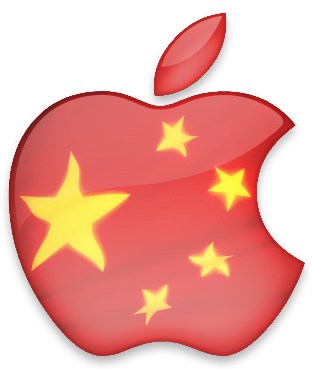Tim Cook has said that China will soon become Apple’s biggest market, but the government is not as besotted as Chinese consumers. China’s state-run media has taken several swipes at Apple this month, moves which may be part of a (heavy-handed) public relations strategy to pave the way for locally grown operating systems as the Chinese government seeks to move its IT industry away from Western software. But if popular response to the anti-Apple articles is anything to go by, Chinese consumers and their iOS devices won’t be so easily parted.
Earlier this week, People’s Daily, the Chinese government’s official newspaper, published articles calling Apple’s customer-service practices arrogant. The People’s Daily article followed a story earlier this month by official government press agency Xinhua, which blamed Apple for an increase in high-interest loans taken out by students to buy “fancy electronic products, most Apple devices.” And just a few days prior to the Xinhua story, China Central Television’s investigative program “3.15” criticized Apple’s warranty practices, saying that the Cupertino company discriminates against Chinese iPhone owners by offering shorter guarantees than in other countries, using refurbished components, and refusing to honor after-sale obligations.
China observer Gordon G. Chang wrote in a Forbes opinion piece that “executives in Cupertino should get worried that the 3.15 show is not a one-off.” What’s at stake for the Chinese government is its efforts to decrease dependency on foreign software by upping the profile of locally developed operating systems. Apple is just one of several foreign tech companies targeted by the Chinese government. Earlier this month, for example, China’s Ministry of Industry and Information Technology issued a white paper declaring that China is too reliant on the Android smartphone operating system (though it overstated Google’s power in China).
The Chinese government is building its own Ubuntu-based open-source OS in partnership with Canonical and Chinese developers. The Linux-based OS, called “Ubuntu Kylin,” is set for release next month, and a China-specific version of Ubuntu Touch for smartphones and tablets may also be in the works. Most of Huawei and ZTE’s handsets are Android-based, but both Chinese companies are working on their own smartphone operating systems. Huawei Device CEO Wan Biao told Reuters last September that the company is “devoting resources into coming up with a phone operating system based on our current platform in case other companies won’t let us use their system one day.” Though ZTE’s operating system was built with Mozilla, it’s also meant to help the company move away from Android. Other major Chinese tech companies creating their own OSes include Alibaba and Baidu.
The Chinese government’s PR tactics have been too over-the-top, however, for consumers to swallow. After the CCTV program, actor Peter Ho posted to his 5.3 million Weibo followers: “#315isLive# Actually, Apple has so many tricks in its after-sales services. As an Apple fan, I’m hurt. Have you done right by your founder Jobs? Have you done right by the young people who sold their kidneys? It’s really true that big stores bully customers. Post around 8:20.”
The strange last sentence of Ho’s post was proof to many observers that he had been instructed to post that message at a specific time. In response, Ho claimed his Weibo account had been hacked. Very few people believed his story and the backlash quickly spread to CCTV.
Furthermore, when independent financial magazine Caijing decided to follow up the People’s Daily story about Apple’s customer service by asking readers on Weibo “which arrogant company or companies do you want to smash?,” the Cupertino-based company didn’t even crack the top of the list. Instead, the top offenders named by respondents were mostly state-owned monopolies, including China’s three major telecom-service providers (China Telecom, China Unicom and China Mobile), three largest oil companies, and its four major banks.
Many of the complaints called out the irony of criticizing Apple’s customer policies when most state-owned companies aren’t exactly known for their friendly service. The Wall Street Journal quoted one user writing under the handle Planet Virus, who said “If we say Apple is arrogant, then most state-owned enterprises are shameless.”
